Ukraine’s gas politics

It is commonly assumed that the main economic challenge facing Ukraine is its dependence on energy supplies, especially natural gas, imported from Russia. But that is only half the story
(opendemocracy.net – Margarita Balmaceda and Peter Rutland – May 8, 2014)
Peter Rutland is professor of government at Wesleyan University in Connecticut, USA. Margarita Balmaceda is Professor of Diplomacy and International Relations at Seton Hall University, and author of The Politics of Energy Dependency (University of Toronto Press, 2013).
It is commonly assumed that the main economic challenge facing Ukraine is its dependence on energy supplies, especially natural gas, imported from Russia. Russia, it is true, has a powerful lever that it can use to extract political concesssions from Kyiv, as it did when President Viktor Yanukovych was forced to renege on his pledge to sign the Association Agreement with the European Union last November.
But Ukraine’s dependency on Russian gas is only half the story. Equally troubling has been Ukraine’s dependency on cheap gas; gas that just happens to be from Russia. Ukraine inherited from the Soviet Union an economy hooked on cheap hydrocarbons. Until last week’s price increases, residential consumers only paid about 25% of what the gas is worth on the European market: industrial consumers pay about 75%. At the same time, coal produced in Ukraine’s Donbas is sold to domestic customers at about half the extraction cost.
This cheap energy, together with the existence of parallel markets for energy, has generated a huge flow of economic rents, up to 5% of the country’s GDP (approximately £3.5 billion) in peak years, which Ukraine’s political and economic elites were able to capture for themselves. The rents have been turned into hard cash either through the re-export of Russian gas to European customers, or through the manufacture of e nergy-intensive products such as steel or fertilizers for export.
This flow of rents produced a political class, both in Ukraine and Russia, who were unified in their collective self-enrichment, and whose common interest lay in preserving the status quo.
The disputes with Russia that disrupted gas supplies in 2006 and 2009 were more about the division of these rents between groups in Moscow and Kyiv than about the price that Ukraine would be paying.
Over the 20 years of Ukraine’s independence, Ukraine’s political class made no serious effort to reduce the country’s dependency on Russian gas. The proportion of Ukraine’s energy imported from Russia fell only slightly from 1991 to 2012, from 50% to 40%.
The first real attempt to correct the problem came after massive increases in the price of gas imports from Russia, resulting from a much-criticised March 2010 contract with Gazprom signed by then Prime Minister Yulia Tymoshenko. It was Yanukov ych’s subsequent efforts to seize more of the energy rents for himself that caused the oligarchs to withdraw their support for him during the Euromaidan crisis.
Adding to this failure to address Ukraine’s gas problem, the political class has also done little to build functioning institutions, such as rule of law or honest political parties, which would attract the loyalty of Ukrainians.
Ukraine suffers from many of the features of the ‘resource,’ even though it does not itself produce any oil or gas, but is merely able to exploit its position as a transit country. Neighbouring Belarus is in a similar situation, except that in Minsk a single individual, Aleksandr Lukashenka, has managed to establish control over the flow of rents, using them to consolidate his dictatorial regime, while in Ukraine they are fought over by a small group of oligarchs.
The Ukrainian people have received some modest benefits from this rent-based economy, in the form of cheap gas and electricity. But in the long run, ordinary Ukrainians are paying the price of being trapped in an economic model that depends on rent-extraction rather than investment in competitive industries. Ukraine is saddled with an economy whose carbon intensity is 0.89 kg CO2/GDP, twice the world average, while much of its rich arable land lies unused.
Essentially the same group of people has remained in power for the past 20 years. For all the talk of Euromaidan as a revolution, the leaders of the new provisional government are the very same figures who formed the government that emerged from the Orange Revolution a decade ago. Yulia Tymoshenko was Prime Minister, Oleksandr Turchynov was Tymoshenko’s deputy, Petro Poroshenko was Secretary of the National Security Council, and Arseniy Yatsenyuk was Economics Minister.
The main factor that caused the breakdown of the post-Orange reform government was disagreement over who would control the energy rents. How reali stic is it to expect them to behave any differently this time around?
Why, then, does the IMF expect such a government to dismantle the energy rent regime – the one thing that holds the political class together? The provisional government in Kyiv is under pressure to rely on regional oligarchs to win back the loyalty of Eastern Ukraine, precisely the men whose fortunes depend on the preservation of the old energy rent regime.
Yet, the IMF has made liberalisation of energy prices a central condition for the release of its £10 billion rescue package. The provisional government has taken a first step in this direction by announcing a 50% increase in the price of gas from 1 May. It is unlikely that they will be able to enforce this price increase. Even if patriotism trumps profit, and the government sticks with the reform, popular dissatisfaction with the price increases will likely erode the legitimacy of the government.
This is not the only proble m with the IMF programme, which the Financial Times described as ‘egregiously optimistic’ in its growth projections for this year and next, especially given the occupation of Crimea and the mayhem being sown by Moscow in Eastern Ukraine.
The crisis currently engulfing Ukraine is not just about a predatory Russia. It is also a question of how to ensure Ukraine emerges from the present crisis as a functioning state, capable of earning the loyalty of all its citizens. The question we should be asking is: why are we waiting for the IMF package to fail, before concerned countries come up with a realistic plan to rescue the Ukrainian economy, and stabilise the country?
Article also appeared at opendemocracy.net/od-russia/margarita-balmaceda-peter-rutland/ukraines-gas-politics bearing the following notice:
 This article is published under a Creative Commons Attribution-NonCommercial 3.0 licence. If you have any queries about republishing please contact us. Please check individual images for licensing details.
This article is published under a Creative Commons Attribution-NonCommercial 3.0 licence. If you have any queries about republishing please contact us. Please check individual images for licensing details.

